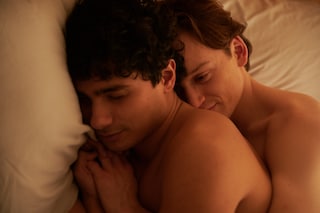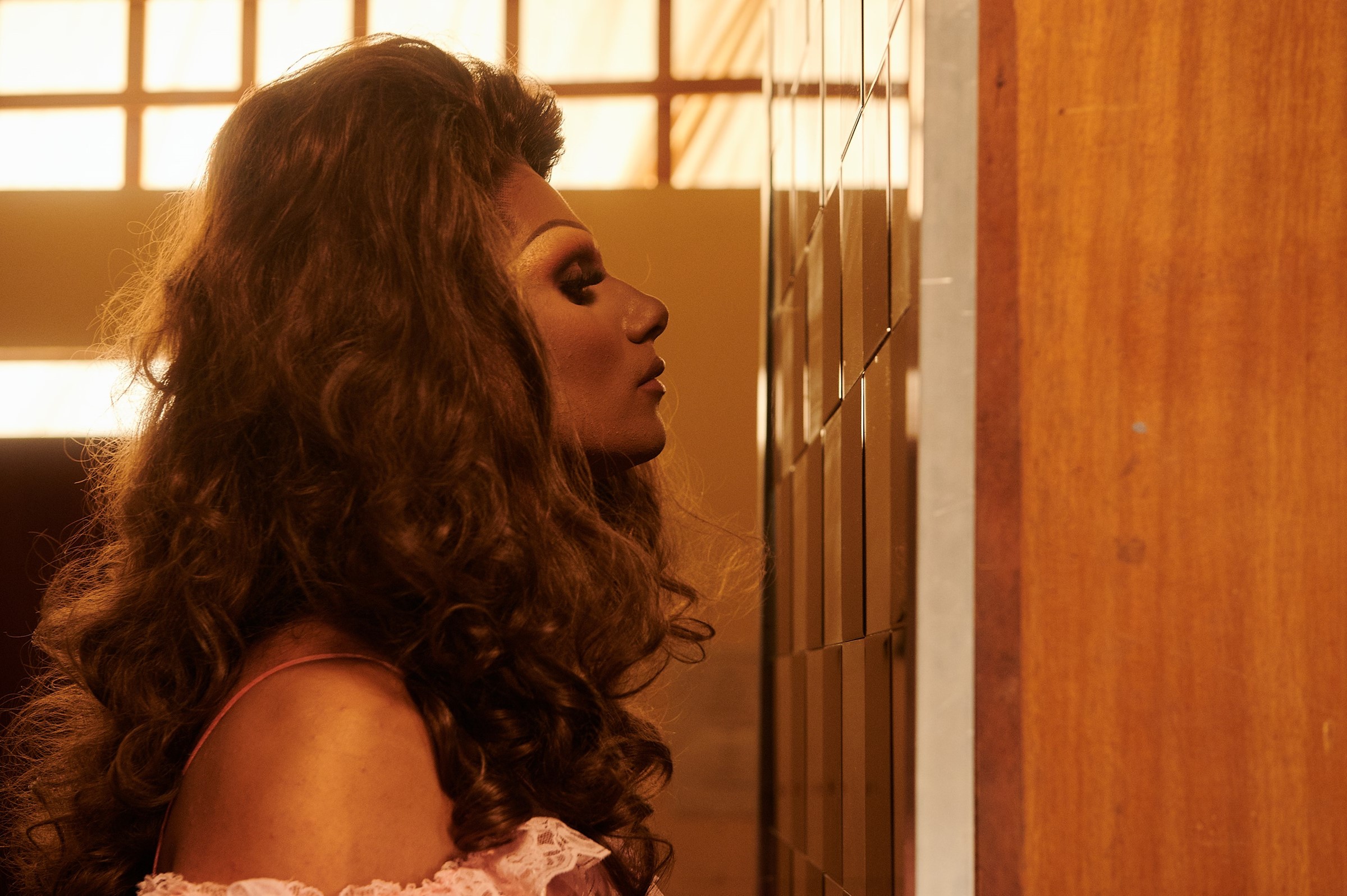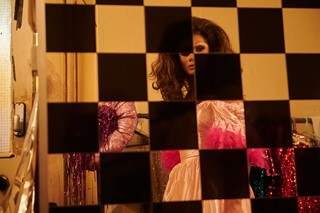A flurry of shimmering sequins, towering wigs, and fake eyelashes, British-Iraqi drag queen and filmmaker Amrou Al-Kadhi’s feature debut Layla is a fabulous and joyful exploration of Arab identity and queer desire. Told through the prism of a roller-coaster romantic relationship between titular character Layla (Bilal Hasna), a technicolour British-Palestinian drag performer, and Max (Louis Greatorex), an amiable white gay man working in finance who falls under their spell after a performance at a corporate Pride event, Al-Kadhi’s is a refreshing take on both gay romance and Arab familial relations.
As the unlikely couple navigate each other’s worlds in an attempt to love and be loved in return, they come up against a series of challenges and prejudices from their families - both chosen and biological - as well as their own internal hang-ups and predilections.
Although Al-Kadhi began writing the film six years ago, its release now feels like a serendipitous correction of the belief that being queer and Arab, or queer and Muslim, are incompatible identities. In a year where self-styled ‘liberal’ celebrities such as Bill Maher have used their platforms to mock queer people standing in solidarity with Palestine while barely concealing their own glee at the (entirely made up) idea of them being killed for their sexuality, Layla is a welcome antidote of queer Arab hope, joy, and defiance. “We started writing it six years ago, and shot it two years ago, but I think it’s good that it’s coming out now,” Al-Kadhi tells me over a video call on the day of the film’s release. “It’s such a hopeful film and it’s a positive take on queer Arab identity. I think the world needs that.”
Below, Amrou Al-Kadhi talks more about Layla.
Niloufar Haidari: What was the inspiration behind making the film?
Amrou Al-Kadhi: What I was exploring at the time in all my short films was the idea of code-switching – this idea of who we are in different environments, and the contradictions of intersectionality. I really wanted to tell a story about a queer person of colour who has to exist in so many different places. I think love is an avenue where we change who we are quite immediately if we like someone and we’re not careful. I really wanted to explore a queer Arab person negotiating every aspect of themselves, and then I thought, well, a love situation is going to be a great way to do that.

NH: I was surprised by how sympathetic I felt towards the love interest, Max, whose character – posh, works in finance – is the type of person I would usually dislike.
AAK: I think there is a version of this film where Layla is a victim and Max is the ‘bad boy’ who fucks them up, but I don’t like stories where people of colour are the victim to white people and don’t have any agency. Part of the reason I wanted to make Max so likeable – or so real, rather – is I didn’t want anyone to be a victim or a villain. I like the fact that Layla is really badly behaved in the film, because I just don’t think minorities get to do that.
NH: What has it been like for you as someone who is both Arab and queer to witness the thinly veiled homophobia and Islamophobia disguised as a commitment to upholding ‘human rights’ that we have seen this past year?
AAK: It’s obviously really tiring, this idea that there’s homophobia in Arab countries, therefore all Arab countries should be bombed. I think in a lot of representations of queerness and Arabness, it’s all about how being Arab and being Muslim are completely inhospitable to queer identity – in a lot of those films you see Arabs rejecting their queer kids. What I wanted to do in Layla was see a queer character reject their Arabness and their religion because of their own internalised racism and internalised issues. Layla’s journey is really a queer person opening up to their heritage and their culture, and about celebrating the intersection of queer Arab identity.
“I don’t like stories where people of colour are the victim to white people and don’t have any agency ... I like the fact that Layla is really badly behaved in the film, because I just don’t think minorities get to do that” – Amrou Al-Kadhi
NH: Layla spends a lot of the film hiding themselves from their family because of what they assume their reaction to their true identity will be, to the point that they lie to Max about their sister having cut them off. Whereas when they do finally come out to her, their sister is not only completely accepting but seems to have known all along anyway.
AAK: Layla has learned to compartmentalise and keep everything separate, because it’s a survival tactic. The film is about integration, and bringing disparate parts of your identity together. Part of what I wanted to do in that sister relationship was highlight the fact that Layla is pandering to whiteness a bit with the boyfriend. I think a lot of people of colour tell white people the narratives that they may want to hear because it’s easier for them to digest. The film is celebrating the complexity of [the idea that] maybe Layla’s parents are a bit homophobic, but the sister isn’t; and maybe the gay character is a tiny bit racist, but ... it’s looking at the in-between space of it all.

NH: Leading a double life is often common for people from Muslim backgrounds, or from more conservative families in general. I like that your film showed that it isn’t necessarily just us who live these double lives – despite being out to his more ‘liberal’ family, Max is also hiding his true self from his family and friends.
AAK: I like that you picked up on that. Everyone in the film is in some kind of drag or performed identity, which is what the film is really about: all these micro dynamics that we’re all in some kind of performance. In a way, Max is repressing his queerness, and Layla is repressing their race – and sometimes Layla is over-performing their race, like when they wear the Islamic abaya in bed and have sex with Max. Sometimes Layla is over-performing their femininity and then their masculinity, and Max is over-performing his queerness and then under-performing it with his family. I think in a lot of LGBT representation, being gay is quite a fixed end point – I wanted to show in this film that everyone’s out, but there are all these varying levels of ‘outness’. The reason the film looks so draggy and constructed in every set, almost artificial – whether it’s Max’s apartment, or Layla’s house – is a nod to the fact that everyone’s performing a kind of theatre in this film, because everyone’s repressing some truth.
“I think in a lot of LGBT representation, being gay is quite a fixed end point – I wanted to show in this film that everyone’s out, but there are all these varying levels of ‘outness’” – Amrou Al-Kadhi
NH: What was your own experience of growing up queer and Muslim, and how has your relationship with Islam changed over time?
AAK: When I first started doing drag in my twenties, at Layla’s age, I was just not integrating at all with my Arab identity. I couldn’t figure out a way to integrate it, because I’d had such bad experiences growing up, with my parents in particular. Because I wasn’t fully out to them, I felt like my queerness and my Arabness were incompatible, so my drag was quite Western. In Layla’s drag, they don’t fully start wearing Arab stuff till the end of the film – their drag exists in a Western space. But there are lots of nods in the film to Layla really accessing their femininity through their Arab culture, like the Sufi spinning. When they’re at the wedding, they really want to dance like the women, and then they feel like they can’t. Similarly to Layla, I felt like there was all this stuff about my Arab culture and heritage that I couldn’t access because my parents didn’t let me, but once I worked through that and met other queer Arabs and came out to my brother, and we got on really well, you get to start to access those things again.
NH: Aside from being a filmmaker, you are also a drag queen. What inspired you to start doing drag, and what does it mean to you?
AAK: I think a bit like Layla as well, it allows you to be confident in a way that you just aren’t in the rest of your life. When we were raising finance for Layla, people felt quite confused by the film, because Layla is in drag and so confident at the beginning, and then they seem really shy. Part of the deception of drag, really, is you get to access this confident side of yourself – when out of drag, you just don’t have it, or you’re trying to have it. So for me, as someone who was really scared about my sexuality, not out to my parents, very scared romantically, my self-worth was so low – to have a space where you could just inhabit all this confidence and just be so defiant … it’s almost like therapy or CBT. You’re just like, ‘Yeah, that’s what I want to be like’, and eventually you start to integrate the two.
Layla is out in UK cinemas now.
